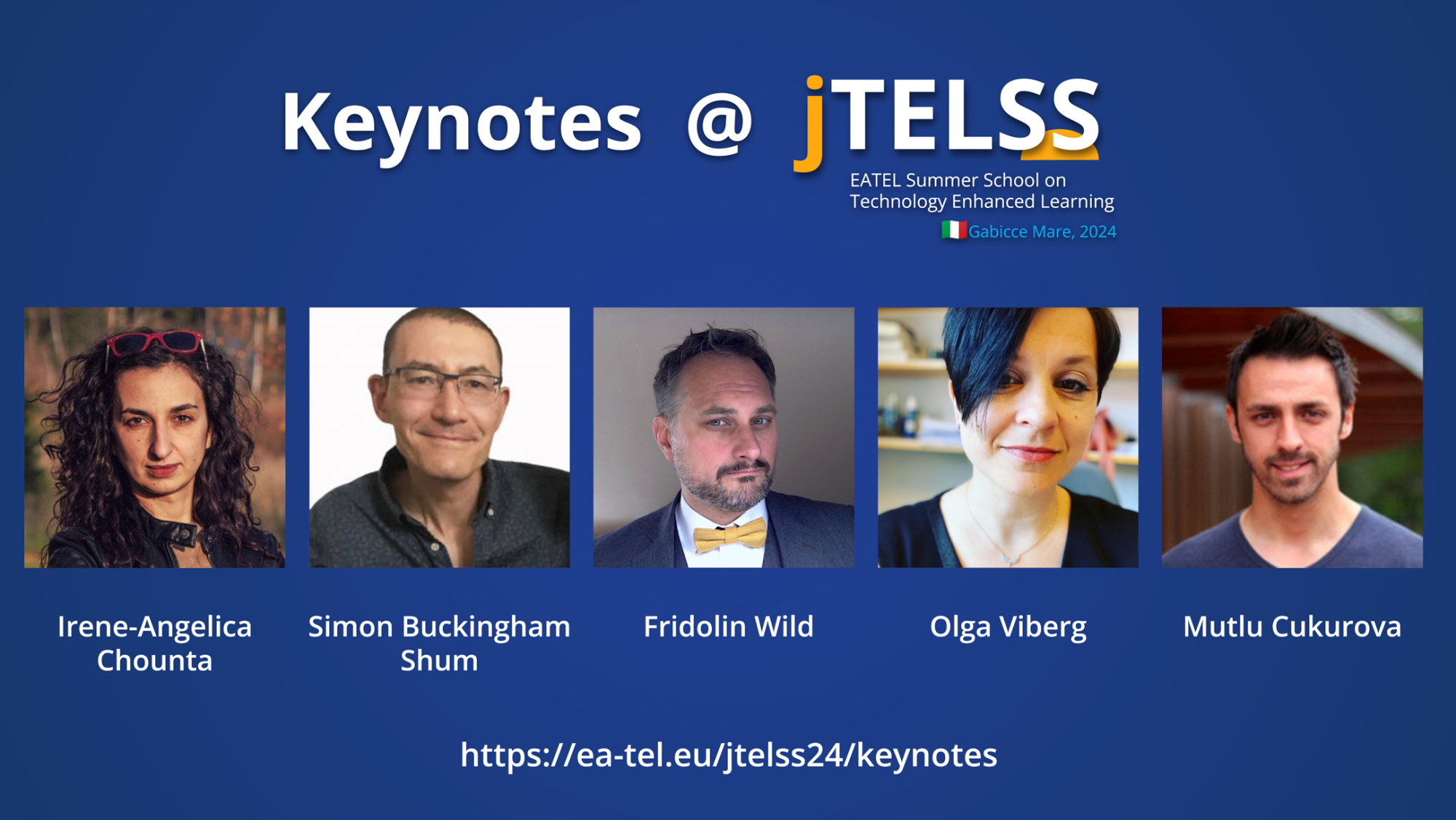Keynotes
At the EATEL summer school on Technology-Enhanced Learning, we are striving to invite excellent and diverse research as keynote speakers!

Reflecting on the premise of Intelligent Tutoring Systems and Student Modeling for personalization and adaptation of learning
☕ Monday 13th May @ 9:00h
The adoption of artificial intelligence (AI) in education provides us with numerous opportunities to support learning and teaching. For example, using cutting-edge technologies for developing intelligent learning environments, such as Intelligent Tutoring Systems (ITSs) or employing computational approaches, such as machine-learning and data mining, to model how people learn. On the one hand, this allows us to explore fundamental questions, such as why some people learn faster or easier than others, or what makes some teachers’ help generous or stingy, straightforward or complex, easy or challenging, On the other hand, it gives us an opportunity to act in real time to provide targeted support to tailor students’ individual needs. In my talk, I will present the open challenge my research aims to address: bridging the gap between pedagogical theory and modern, data-driven practice in the context of intelligent tutoring systems (ITSs) and student modeling. I will discuss the concept of the “Grey Area”, a computational, machine-learning approach for modeling the Zone of Proximal Development (ZPD) of individual students in ITSs and demonstrate the application of this approach to provide personalized and adaptive scaffolding. Finally, I will reflect on theoretical and practical implications of the use of artificial intelligence in education for personalization and adaptation from the lens of human rights, democracy and the rule of law.
Can TEL save the planet?
☕ Monday 13th May @ 21:00h
I don’t think it’s overstating matters to say that humanity finds itself at an inflection point. The interlocking crises can feel overwhelming (ecological; political; financial; technological; medical; spiritual…). And I don’t know about you, but I’m finding it increasingly surreal attending conferences where these are not mentioned, and seem to have zero impact on our work. Or is this just ridiculous ranting? Why indeed would irreversible ecosystem collapse (for example) change how we think about TEL, pedagogy, analytics or AI? Sure, it’s really sad, but does it make sense to ask how this impacts our research? So, while it’s an exhilarating time to be working on TEL given all the AI advances, the societal challenges are daunting, and I find myself reflecting increasingly on whether this brings a responsibility to those of us who invent the future of TEL. How do we go about wrestling with this? How do we stay hopeful? I invite you to hear my thoughts-in-progress, and disagree with anything I say! We have a whole week to discuss and sort this out…
Embedded learning with Augmented Reality
☕ Tuesday 14th May @ 9:00h
Almost overnight, The Metaverse has become mainstream. Today’s technology is already captivating, with mainstream buy-in of IT giants like Apple, Microsoft, IBM, Nintendo, Sony.
Digital transformation of education seems imminent. An evolution of technology-enhanced learning is already visible. Next generation technology will turn our physical surroundings into a canvas for digital augmentation, where we can embed knowledge directly right where the action happens, and performance is required.
Everyone is gearing up for a future of learning in the overlay reality.
Everyone? Smart Glasses are still a privilege, mobile AR limited, digital poverty on the rise. The promised liberation of learners from decades of being tied to their screens is still a fantasy. But it does not need to be.
Fridolin reviews achievements of recent years for the research frontier of ‘embedded learning with AR’, sharing insights into advances in human computer interaction, AI, and learning by experience. He illustrates this with research of the Performance Augmentation Lab at the Institute of Educational Technology of The Open University and its collaboration partners.
Sharing grand challenges for technology enhanced learning research and practice. And informed by insights from building – with a £5.8m capital investment – new openXR studios to enrich production of 260+ course programmes in the very near future, set to open in 2025.
Cultivating Trust and Values in the Era of AI-Powered Education
☕ Thursday 16th May @ 9:00h
As adoption of AI in education has rapidly increased, the promise of transforming teaching and learning practices emerges. AI-powered technology offers opportunities to improve student learning outcomes, foster critical thinking, and refine problem-solving skills through features like personalized learning paths and immediate feedback. Similarly, educators stand to benefit from streamlined planning and assessment practices. However, alongside technological advancements, it is our responsibility to foster trust as well as to consider and sustain values in the adoption and utilization of AI-powered technologies for broaden inclusion and equity among stakeholders in education. This keynote delves into the intersection of AI in education, exploring the significance of trust and values, including educational, human and cultural values, in the adoption and utilization of AI technologies for learning and teaching in educational settings. Drawing upon interdisciplinary research and practical case studies, strategies for nurturing trust and upholding values amidst the advent of AI-powered education will be discussed.
Beyond the Hype of AI in Education to Visions for the Future
☕ Friday 17th May @ 9:00h
The shiny allure of Artificial Intelligence (AI) has been making headlines in recent years with the popularisation of large language models. Yet, the full potential of AI in educational research and practice remains largely untapped. Do you remember the excitement when the first computers entered our schools? The promise was revolutionary: kids would learn faster, better, and more individually. Fast forward, and it becomes clear: the focus isn’t merely the computer on the desk but rather humans and our interaction with it. The same goes for AI. This talk will navigate the confluence of Learning Sciences and AI, delving into three distinct conceptualizations of AI in educational research and practice. By drawing upon robust research evidence, I will unpack the benefits and limitations of each conceptualisation, painting a nuanced picture of how AI can be harnessed, grounded in our deep understanding of human learning processes and human values. Through examples of our recent work, I will emphasize the role of AI in augmenting human capabilities rather than replacing them, thereby accentuating the humanistic values inherent to learning and education. The journey of integrating AI in education is more than a tech challenge; it’s a human one. And as we make strides, we should not be losing focus on what matters the most and how our research can contribute to it.




